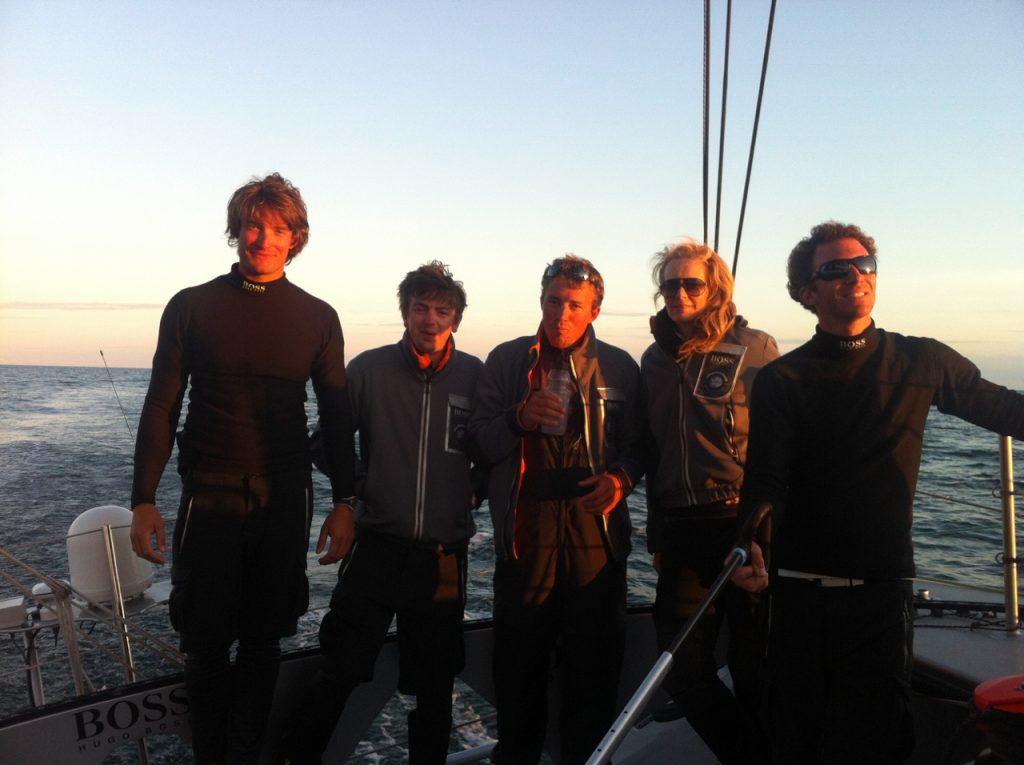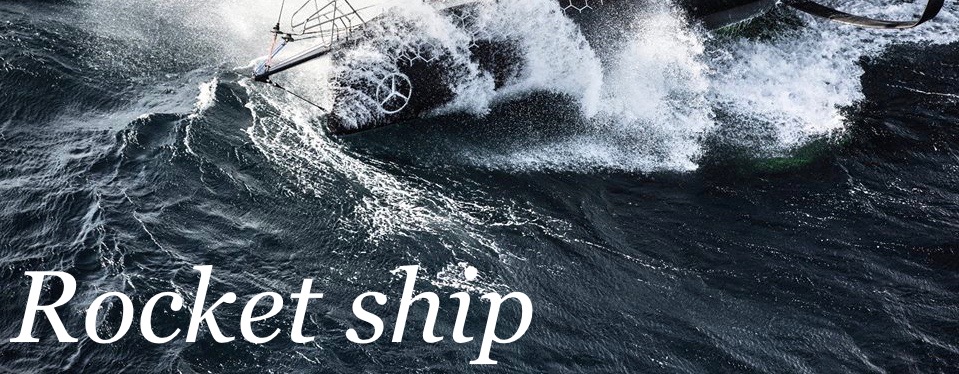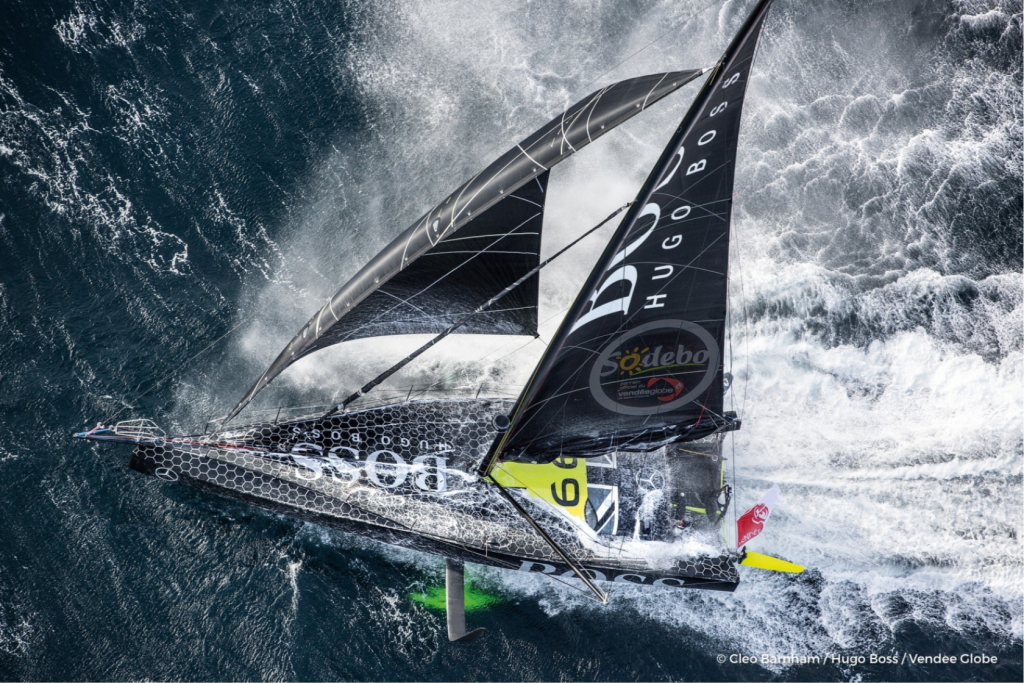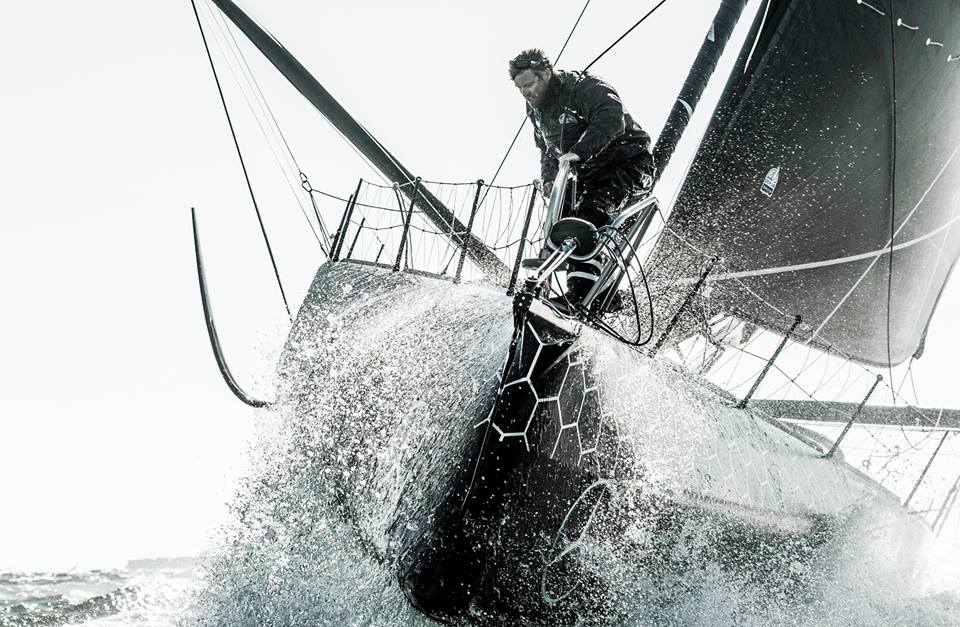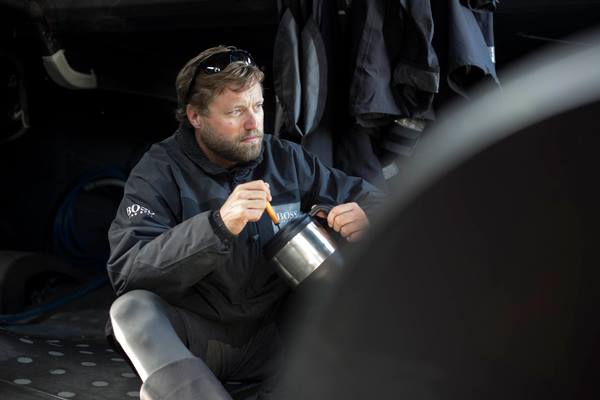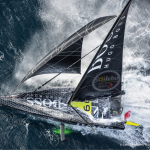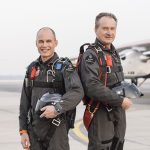Sailing has never been faster, more expensive or as technological as it is now. But at the end of the day, it’s still about adventure and a human endeavour, tells solo sailor Alex Thomson.
By Camilla Alfthan
IT WAS THE SAILING LEGEND, Sir Robin Knox-Johnston who taught the British yachtsman to navigate with the moon and the stars. Sir Robin had invited the 23-year old on an expedition to Greenland as his first mate only a few months before the beginning of his iconic Clipper Race which Alex Thomson would win as the youngest skipper ever.
Since then, Thomson has broken several world records, and competed in three Vendée Globes; the Everest of the Seas which was created in the spirit of the Golden Globe; the first non-stop solo race round the globe via the three capes, Good Hope, Leewin and the Horn created in 1968. Of its nine sailing pioneers, Knox-Johnston was the only one to complete the journey after an exhausting 313 days at sea. Today the boats have evolved enormously. When Alex Thomson finished the latest edition of the Vendée Globe it took him just 74 days despite the fact that he was sailing with a major handicap.
“On day thirteen the foil broke, but I still had to go around the world.
That was really the story of the race to me,” tells the 43-year old sailor aboard his HUGO BOSS boat during a visit to Copenhagen. The foil is still missing but he has a crew of three people which is a major luxury considering that he was all alone around the globe. While several competitors abandoned the race for various reasons, quitting was never an option.
“It’s about your goals and about staying positive. If your foil breaks it means your not going to win so you’re not motivated. So you have to change your goals. ‘I can’t win, I probably won’t finish and I’m lucky if I stay in the top ten.’ Then you have to adjust your goals to make them hard but achievable, so that you reach your goal.”
Part of all this was about how do you remain happy?
“It’s not pleasant and I have a huge handicap – a broken foil. It sounds corny. But I genuinely feel that if you walk around with a miserable face you’re probably going to be miserable. But if you walk around with a smile on your face you’re gonna feel a lot more positive. Many sports people like me strive for the ultimate succes because they think that is what is going to make you happy. But I think its the other way around. Being happy is much more likely to get you through to your succes. That’s how I tried to spend my time even if I wasn’t happy at all – I was really pissed off!”
Alex Thomson and his team had three goals in the Vendée. The first was to finish, the second was the podium, the third was to win. “We didn’t really know how good the boat was. I just had to change my mind set and learn to sail it differently. The boat sailed with a lot more lean, so I had to push a bit harder to try to try and keep up. I told myself ‘What would be more positive than winning the race now, that would really make a story’. I tried to look at things in a positive light.”
At lot has changed since the beginnings of solo racing. Now people can follow you daily online.
About 200,000 people watched me and it was really not about the technology. It’s about adventure and human endeavor; its an amazing story. One of the great things we can provide is content. We’re all so starved with content and as long as you can provide something vaguely interesting people will want to watch it and follow it like a football match.
At one point you looked rather scared when you were filming during a storm at night.
Part of it is conveying what it is really like. And in that scenario when it is dark outside and the boat is going very fast it’s quite a challenge.
When you go downstairs it’s pitch dark and the noise is extreme, you know there’s no one who can save you if something goes wrong. You freak out. You’re scared, your brain pumps adrenaline into your body. I wanted to convey what it was like; how I felt.
I have some techniques to be able to deal with the stress and making the videos helped.
“People think we have to be crazy to do it but it is really the opposite.”
They went directly from my phone to the internet, without any editing. They create a huge following and people then write comments that my people send to me. So I inspire them with what I’m doing and they inspire me by their reaction to it.
With my sports psychologist we have a number of techniques to deal with the extreme situations. One of them is the helicopter view. When I’m downstairs in my bed and my brain is going ’you’re gonna die, you’re gonna die’ I can visualize myself not being on the boat any longer. I see it from above at cloud level, I can see where it’s going, how fast it’s going, that there are no detainers, no whales, no icebergs..by doing that it allows me to lower my heart rate, reduce my adrenaline and get some sleep.
You don’t sleep much, either.
I only sleep twenty, or forty minutes. It’s a real management exercise to learn how you manage your sleep. To me the sport is about discipline.
People think we have to be crazy to do it but it is really the opposite.
You’re sailing a sixty foot boat in troubled seas, all alone, that’s a lot to keep track of.. This is a rocket ship. We have the world speed record for our class. In terms of tech this thing is quite unique and my baby. The foils – the wings that physically lifts the boat – are not as extreme as in the Americas’ Cup but a bit like that. The boat is designed with me and for me. It took altogether 40,000 man hours in one year and the design before that took one year. So it took two years to make it and it cost about 4,5 – 5 million euros. It’s not a small amount of change.
One problem is bumping into things. Breaking the mast. There’s potential issues everywhere. There’s an element of luck. But it’s also down to what choices you make. The technical challenges is what I love the most.
How do you produce something which is fast enough to win the race and yet strong enough to last?
If you make it more reliable you make it slower, and if you make it faster you make it less reliable – it becomes more fragile.
Coming back on the Atlantic Alex broke the 24h record whilst sailing on starboard tack and using his remaining foil. “The addition of the foils have really been the main difference between sailing my new boat compared to my old boat. The foils are what makes them reach these new speeds by lifting the boat out of the water, creating less drag.”
And the weather..?
When you sail around the world in 74 days you see it all. The coldest weather was at the end. The last two days the wind was minus 15 and the rails had icicles. I chose to slow down a bit at the end, so I’d arrive at daylight.
You came in 16 hours after Armel L’Cléach. How was it to meet up afterwards – how deep does the rivalry run between skippers ?
The arrival back into Les Sables d’Olonne is incredible, from the channel, all the way to the pontoon and race village, there are tens of thousands of people waving you back in and the atmosphere is incomparable. Being greeted by Armel and being able to shake hands and share experiences from the race is an amazing feeling after competing for so long.
We respect one another and there’s no other sport where it is the same. One of the reasons I love sailing, and particularly off shore sailing, is when you leave sight of land you then have an understanding of how small we are as a human race. And that’s a very humbling experience.
For the skippers, we’re fierce competitors, we’re desperate to beat each other. If something goes wrong we’re rescue services for the other people so the core of the relationship we have is amazing sportsmanship and huge amount of respect.
Is it easier being second during the race – chasing the guy rather than being chased?
In the situation where I was catching up it was terrible for him. He did not speak so much about it but his team did. They said he was a mess. He finished second the last time, and the time before. Twice. So it would have been terrible for him. For me I had nothing to lose.
One former Vendee Globe winner who watched the race said the interviews are the most stressful thing, especially towards the end.
They are part of the job, but the French are not the most communicative people. If something goes wrong they don’t like to say it because they think that might change the way other people compete against them.
Whatever people say to me it’s not going to change the way I sail. I said from the beginning that we’re going to be completely transparent. I took pictures of the foil and sent it to my team who chose not to show it which added to the conspiracies. That made me laugh. These things are extremely expensive to make and take four months to make. It’s not like you’re going to be able to do anything about it.
So I wanted to be transparent. We wanted to be the team that delivered the most content, so we did it everyday. The French public loved it, the fact that I made the effort to communicate.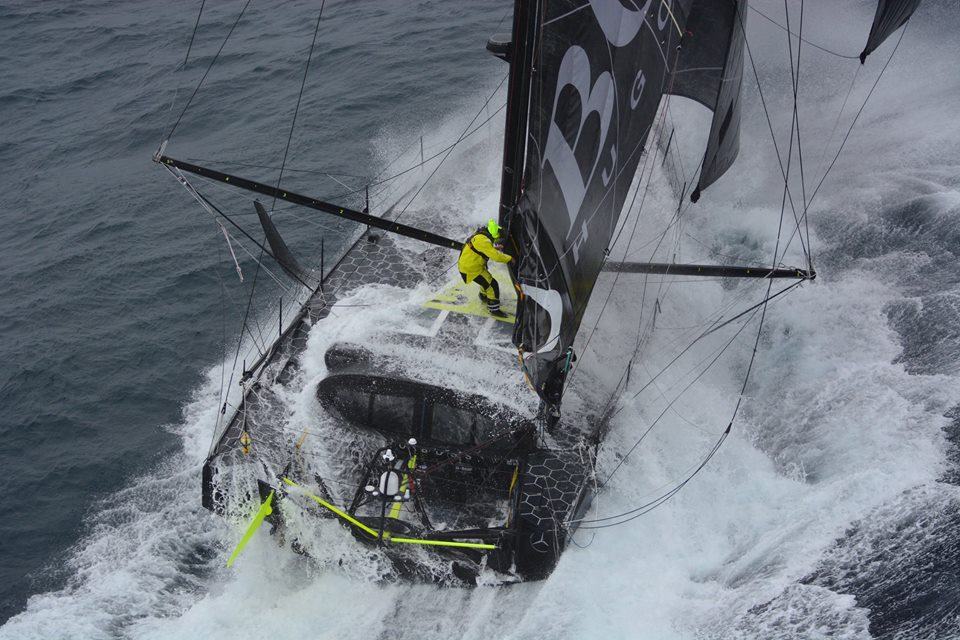
The most viewed video was shot by a French navy helikopter off the Kerguelen Islands when you hoisted the Union Jack. Wasn’t that a little bit dangerous?
It wasn’t dangerous but it looked great.
In terms of rivalry there has never been anything bigger. ‘Les Rosbeef and the Frogs.’ With Brexit – it was amazing. A French journalist said at the press conference, ‘We hope you’ll win next time’. At the end, I shouted ‘Are you ready for a British winner?’ and they screamed ‘Yes!’.
They appreciate the effort and the challenge. They’re an amazing public, they really care for it. If you make an effort they reward you for it.
The technology has become a huge part of the sport.
The boats go bloody fast now and in less wind so my boat goes the fastest in no more than 20 knots of wind. Because we know that, and we use a piece of software that tells us the best way to go, it’s faster not to be in more wind than that. So you choose less wind. The computer chooses it.
How reliable is the computer? In the Gotland Run a few years ago your boat hit rocks that the GPS did not show.
The GPS is not perfect, if we’d been a meter the other way we would have been fine. We should have taken a lot wider birth. The chart is not a 100 percent accurate, either, when you imagine how many rocks you have in the sea there’s always going to be differences. It was a nasty chock but nothing happened. It’s one of the things that can happen, like hitting the curb when you’re driving a gocart.
What happened when you tested the boat in Spain before the Vendee?
We were two people when a wave hit the boat and in less than a second it flipped upside down. Immediately everything was black. My co-skipper said we had to get out. We opened the door and water came in. I said ‘I think we have to go in and shut the doors’. He jumped in the sea to swim away. Before I went in I had the wits to hit the keel button and the boat flipped up again now full of water.
We were rescued by a helicopter. We were in shock and flew to La Coruña airport wearing dripping wet survival suits…They showed us to a little grey door. It opened and we walked though….and we were in arrivals! People were stunned, they were like ‘I’m not getting on his airplane!’. (Laughs). We went straight to the port to rescue my baby. I was quite proud to have done so but my team was devastated, they’d put thousands of man hours into building it. We had to think positively. We picked up the pieces and repaired it. ‘Thank you for showing us the power of never giving up’ they said afterwards. I said, ‘Dont worry – every cloud has a silver lining’.
Long, challenging hours at sea with very little sleep can sometimes make you feel grumpy. But never alone. “I some times feel isolated, but I have my family, friends, and supporters, so I cant feel lonely.”
You’ve compared the sport to Formula One..
There’s huge similarities between the sports. One driver, high speed, and all the technology. Both our sports are governed by rules. What stops development are the rules. We probably have less rules than F1. The structures for instance, we probably have less rules around what you can do with the composites. We’re able to advance technologically.
F1 cars are built with 200 kilos of carbon fiber, there are rules about what you can do. Ours is 2,000 kilos of carbon, the rules mean that we can be more innovative with it.
People who know F1 and who go aboard say ‘Wow, this is really the same’.
I took Lewis Hamilton with me in the Cowes. There was an incident and the press wrote ‘Hamilton crashes again’.
The difference is that you’re racing with sustainable energy – wind power.
We actually took 200 liters of diesel, two tanks of fuel basically to go around the world. Next time we hope to make it completely fossil fuel free. We went from no knowledge to foils working two years later. Once we’ve figured out how to fly on the sea we’ll see some big advances in how to transport goods on sea. We’ll see how the revelation start to evolve now.
One of the things I picked up was how one man on a boat for three months accumulates a lot of rubbish. You see it in one place when normally, you throw it in the bin and you never see it again. I was quite chocked. And I probably wasn’t creating half of what I usually create. It was really quite disturbing.
I ate freeze dried food and had to make my own water. I only carry ten liters of water, so it made me realize how much we consume, and how much we waste. We normally don’t take care of the water. You just turn on the tap, leave it running to get the right temperature. On a boat I dont waste a drop.
You appreciate the simple things in life.
Do you prefer to race with a crew or alone?
The ultimate challenge is to to be alone. In terms of sociability I’d rather be with other people. But on your own the challenge of what you’re doing is incredible. There’s less than a hundred people who’ve done what I do. It’s an incredible privilege to be given the possibility to do it. The competition is very fierce. But it’s a team event to have that boat in that position where it’s about the choices we make. I end up being a small part in that team. By the time the race starts its less stressful than the build up.
We have the highest class. Whether I have a fast boat or a slow boat I still do my work at sea.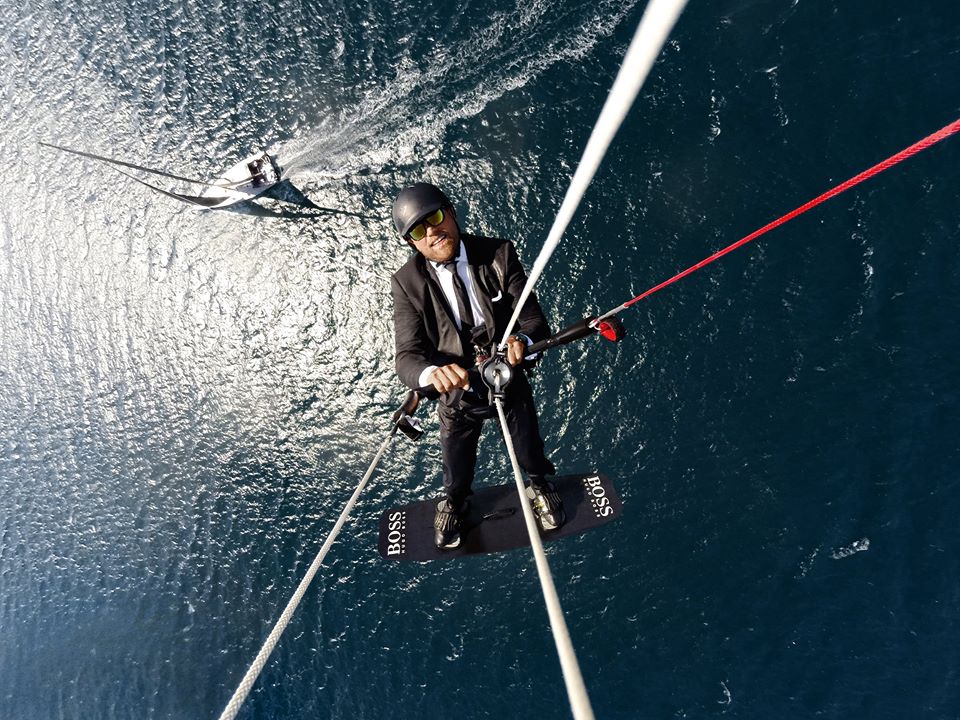
In the last two Vendées Alex Thomson came third and second, which means that a first place in the 2020 race is his next goal. When he’s not racing he’s invented stunts for his longtime sponsor, Hugo Boss – kite flying above his boat, walking on the keel and even on the mast dressed in a Boss suit
Sir Robin Knox-Johnston has played major role in your career and also Sir Kenneth Miller.
Kenneth is a passionate sailor and sportsman. He created Sportaid for disadvantaged children to empower them, and he’s the man who got the 2012 Olympics to London.
He is my financial mentor. We met in the Clipper race where he came as crew and became friends. We talked about the Vendée Globe as the ultimate challenge. When I was back home he sent me a parcel in the post which had a plaque inside with a picture of a boat and a sun, and the inscription ; ‘Risk – If you want to discover new worlds – at first leave sight of the shore.’
I phoned him and thanked him for kicking me in the arse. He said I had what it took to participate in the race. He wanted to help me prepare for it, and make a business out of sailing. We contacted 900 companies over the course of a single year.
He ended up buying me a boat for 1,1 million pounds. It was a big risk for him. It was also a time when I got my first world record, and other records.
How much is about luck?
People always talk about luck. In sports when you get your details right you suddenly get lucky. Its about having a positive attitude. You learn from your mistakes, and you improve. So in a sense you celebrate your mistakes because they take you further. It is from our mistakes that we learn the most.
©
Sailing with Alex Thomson in the Gotland Run – an awe inspiring experience which required work around the clock to keep ahead of the race. My task was snap shooting the adventure and interviewing the boys; the kind of work that makes journalism great fun.